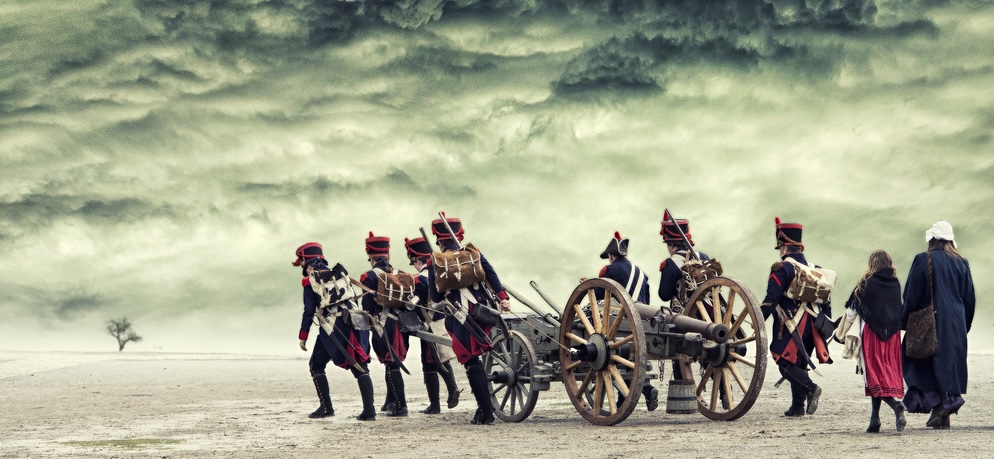It’s a common belief today that all war is evil. This is especially true in the wake of the confusing quagmires that have come to characterize warfare in the 21st century: Afghanistan, Iraq, and now Ukraine. So many of these conflagrations have felt indecisive, meaningless, and utterly dehumanizing (especially with the rise of drone warfare).
However, insofar as wars actually do decide controversies and carry meaning, they are not necessarily evil. In fact, such wars have noticeably pushed humanity in the direction of greater scientific and artistic innovation, more personal and political freedom, and greater material prosperity. Rather than regard every war as unfortunate products of man’s fall from grace, better forgotten, some of these conflicts should be remembered, analyzed, and, yes, even celebrated.
Such is the argument that writer and classical pianist Michael Walsh makes in his new book, A Rage to Conquer: Twelve Battles that Changed the Course of History. Because Walsh is not a typical historian, his take on otherwise well-known events in the past is refreshingly unique. Although he gives due attention to the technical details of battle formations, military technology, and on-the-ground circumstances, his real focus is on the ideas and personalities involved. Over the course of the book, it becomes evident that Walsh is a true romantic, always in search of genius, artistic expression, and epic dimensions.
Aware that his project of identifying the critical battles that have shaped history has been undertaken before, Walsh hopes to go deeper and examine the essential factors that went into these historic clashes. Citing Prussian general Carl von Clausewitz, who wrote extensively and authoritatively on war, Walsh explores two central ideas. The first is that war is an extension of policy instead of an alternative mode of politics (as Clausewitz’s statement is popularly translated, “War is the continuation of politics by other means”). Here Walsh reframes how armed conflict should be assessed by people today: If a battle advances national goals, then it has a purpose that transcends the usual short-term pursuits of looting, enslaving, and dominating.
The second idea recognizes the role of friktion in warfare, which helps distinguish those great generals who knew how to harness the potential power of their armies and seize the moment. While responding well to friktion didn’t make these generals conventionally good people, it did make them virtuous in the heroic, manly sense.
After outlining his motives, Walsh dives into the battles. True to form, he begins with the semi-mythical Battle of Troy and the leadership of Achilles. This gives Walsh the opportunity to discuss what he believes is most important in war: not the granular details of particular battles, but the overall influence and cultural impact these battles had on the people involved and their descendants. More than any other war up to that point, the Trojan War and its heroes informed Western imagination and inspired countless young men to become warriors fighting for glory and a certain way of life.
One such man who was inspired by the story of the Iliad was Alexander the Great, who treasured Homer’s epic and took it everywhere he went. Naturally, Walsh discusses his victories at Chaeronea, Granicus, and Gaugamela. Alexander is Walsh’s first verifiable example (unless one counts the half-divine Achilles) of a military genius who understood the importance of warfare and recognized what was possible on the battlefield: “Prodigies are hardly unknown in the world of the arts, and they appear throughout history, able to penetrate the heart with insight and wisdom far beyond their years. So it can be with generalship as well—as Alexander proved.” By contrast, the most successful military leaders before Alexander had won their battles through superior numbers, better physical defenses, higher morale, or sheer dumb luck.
Alexander’s spiritual successors in the Roman world also combined this strategic thinking with greater political and cultural objectives. Consequently, Walsh discusses Julius Caesar’s Gallic campaigns, culminating in the Battle of Alesia; Constantine’s Battle at the Milvian Bridge, which culminated in his absolute rule of Rome; and Aeitius’ defense of Western civilization in his triumph over the Huns in the Battle of Chalons. These men, each of whom had enormous flaws (particularly Caesar), nevertheless fought against the forces of chaos and pushed mankind forward with their victories. Had they not won these battles, the cultural and political achievements of both the Roman Republic and the Imperium would have been wiped from history, preventing the emergence of the modern Western world centuries later. In other words, there would have been no Renaissance, no Scientific Revolution, no Age of Exploration, and no nation-states—at least not in Europe.
~ ~ ~
The twin themes of genius and progress are probably what caused Walsh to completely skip half a millennium of military domination by Muslim empires, which largely perpetrated the very worst aspects of war. And so his next chapter covers the First Crusade, led in part by King Bohemond of Taranto. Although the Saracens and Turks would eventually recover the Outremer kingdoms carved out during the Crusades over next few centuries, Walsh persuasively argues that these efforts by the Christian West were crucial to the later development of modern Europe. The Christian West would slowly tease out of its spiritual tenets various kinds of freedoms and humanistic principles that would not have been possible in Islamic and other non-Christian cultures.
Walsh makes another jump in history with his discussion of Napoleon Bonaparte. Arguably more than any other figure in Western history, Napoleon revolutionized warfare through the application of military meritocracy, much greater use of artillery, and breaking up his armies into more mobile and autonomous squadrons. Considering why Napoleon inspired so many great artistic masterpieces, Walsh suggests that artists and intellectuals “saw in him the birth of modern man: self-actuated, beholden to no one but himself—the ideal of the individual taken to the extremes of narcissism and overconfidence in his own abilities and in the infallibility of his judgment.” Even though Napoleon was eventually stopped, his legacy remains and effectively ended the ancien regimes of Europe based in codes of chivalry and obsolete monarchical rule.
Unexpectedly, the best chapter of the book covers three battles in the two World Wars, won by three fascinating Americans: John Pershing, George Patton, and Chester Nimitz. Perhaps because America’s ascendency during these decades is often taken for granted, the men who brought this about are forgotten or overlooked in discussions on military genius. Nevertheless, Walsh demonstrates how Pershing introduced the American military to global modern warfare in the Battle of Saint-Mihiel in WWI, Patton showcased the utility of tanks in the Battle of the Bulge, and Nimitz established American naval supremacy in the Battle at Midway. The United States didn’t win these wars by simply outproducing the Axis powers, as is commonly presented to students in history classes, but rather by virtue of its heroic leaders who mastered the art of friktion and setting clear objectives for their battles.
The best chapter is unfortunately followed by the worst, “The Battle of 9/11.” While Walsh claims that America’s current decline is directly attributable to the absence of the kind of men he wrote about in his previous chapters, the whole discussion feels out of place and clumsily tacked on. He directs his ire at President George W. Bush, who broadened his response to 9/11 (which, to be sure, was not a battle) to the global War on Terror that somehow failed to include Saudi Arabia, where most of the terrorists actually came from. In the process, Walsh insists, Bush ordered that American civil liberties be “shredded in the name of ‘safety.’”
Whether or not the reader agrees with Walsh in this criticism, the only real connection it has with the rest of the book is that it pertains to war. Moreover, he claims, “We know from history what other, more secure, cultures would have done,” but fails to follow this assertion with any precise prescriptions. Above all, it is never made clear why he dwells on an event from two decades ago instead of placing his argument in the context of the current day.
Another major weakness in Rage to Conquer concerns Walsh’s relatively sparse historical research. While his extensive background in the arts and art criticism serves him well in re-creating scenes of battle, he has a bad habit of leaning on only a handful of often-fallible sources, causing him to mischaracterize certain historical realities. This comes out especially in his chapters on the Roman generals, where he continually cites Edward Gibbon and Bart Ehrman, two scholars who harbor deep prejudices against the early Church and Christian historical scholarship. Similarly, he makes too much of his favorite historical fiction, such as Tolstoy’s War and Peace, Homer’s Iliad, and Shakespeare’s Troilus and Cressida. As for primary sources, he does cite Caesar’s journal of the Gallic Wars and Napoleon’s journals, but again tends to overlook their slanted perspectives.
Fortunately, the jarring final chapter and occasional historical sloppiness do not sink the book as a whole, nor do they detract from Walsh’s main purpose in showcasing how and why war has been romanticized down through the years. After all, Walsh is a brilliant and seasoned writer who knows how to enliven any topic. His accounts may be at times inaccurate and his critiques may invite objections, but none of them are ever boring. The same can’t be said for the majority of modern historical writing, which is often entangled in dry conversations about historical methodology or useless trivia. (A recent example of this is Alexandria: The City that Changed the World by Islam Issa, which I wrote about here.)
For most readers today, the argument and style of Rage to Conquer is exactly what’s needed. Considering the destructive power of modern warfare, the obvious preference is for peace, but this should not obscure the occasional necessity of war to prevent being overrun and overwhelmed by sheer barbarism. When this is forgotten, Edwin Starr is right to sing that war is indeed good for “absolutely nothing.”

